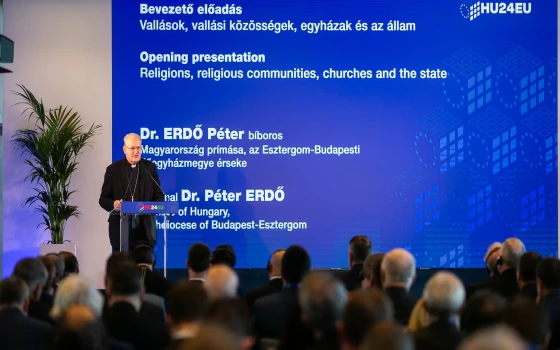
بدون مشاركة اسلامية .. رئاسة الاتحاد الاوروبي نظمت مؤتمرا حول المسئولية المشتركة والتعاون بين الدول والمجتمعات الدينية في اوروبا

- Europe and Arabs
- الاثنين , 28 أكتوبر 2024 11:40 ص GMT
بودابست ـ بروكسل : اوروبا والعرب
تحت عنوان "المسؤولية المشتركة: التعاون بين الدول والجماعات الدينية في أوروبا" انعقد المؤتمر الذي جرى تنظيمه نهاية الاسبوع الماضي في بودابست، حيث عاصمة الرئاسة المجرية الدورية الحالية للاتحاد الاوروبي التي قالت على موقعها الاليكتروني ان المؤتمر تناول ملف الشؤون الدينية، و حضره 160 مشاركًا، وتضمن استعراض مواضيع مهمة ومناقشات مستديرة في فترة ما بعد الظهر، استكشف خلالها المشاركون الوطنيون والدوليون قضايا مفيدة. ولم يشر البيان الاوروبي من قريب او بعيد الى اي تمثيل للجالية المسلمة في اوروبا ككل اوفي المجر على الاقل .
وحسب البيان الاوروبي "افتتح المؤتمر بسلسلة من الكلمات الترحيبية. نيابة عن المضيفين، رحب ميكلوس سولتيز، وزير الدولة للعلاقات الكنسية والأقليات الوطنية في مكتب رئيس الوزراء، بالمشاركين. ألقى ممثلو الكنائس التاريخية في المجر كلمة ترحيب أو عرضًا تمهيديًا لتقريب وتعميق الموضوع الرئيسي للمؤتمر، ألا وهو القضية المهمة المتمثلة في التعاون بين الدولة والجماعات الدينية، سواء في المجر أو في أوروبا. أولاً، شارك جوزيف شتاينباخ، الرئيس الرعوي لسينودس الكنيسة الإصلاحية في المجر وأسقف منطقة كنيسة الإصلاح عبر الدانوب، أفكاره مع الجمهور، والتي أعقبتها رسالة ترحيب من الأستاذ الدكتور أندور جروز، رئيس اتحاد الجاليات اليهودية المجرية (MAZSIHISZ).
أوضح الكاردينال الدكتور بيتر إردو في عرضه أن التنظيم القانوني السابق والتعاون الذي ركز على النظام التنظيمي للكنيسة يتم استبداله بنهج الحقوق الأساسية للممارسة الدينية في جميع أنحاء أوروبا، والذي لم يعد يركز على الكنيسة كشريك تنظيمي، بل على الفرد كموضوع للحرية الدينية. وهذا يساعد أيضًا العلمانية على اكتساب أرضية.
اعقب ذلك عرض قدمه الدكتور ماثياس إينيجر، وهو باحث ديني سويسري كان يدرس ويبحث في التنوع الديني للدول وتعاون المجتمعات الدينية مع الدول لعقود من الزمان. في عرضه، سلط الضوء على أنواع التعاون بين الكنيسة والدولة، وأعطى أمثلة لنماذج قيد التنفيذ في بلدان مختلفة. بالإضافة إلى تقديم أمثلة دولية والنظام السويسري في بلده، أشار أيضًا إلى النموذج المجري، الذي بحث فيه وأشاد به، وتنوع قائمة الكنائس القائمة، والنظام السخي لهياكل دعم الكنيسة.
في جلسة "عصر المخاطر"، قدم جورجي هولفيني، عضو البرلمان الأوروبي (مجموعة الوطنيون من أجل أوروبا)، عضو لجنة التنمية في البرلمان الأوروبي، الاضطهاد المتزايد للمسيحيين. ثم قدم تريستان أزبيج، وزير الدولة لمساعدة المسيحيين المضطهدين، المبادرات المجرية وبرنامج مساعدة المجر الفريد لمساعدة المسيحيين. تلا الإحصاءات وتقييمات الوضع عرض مؤثر للغاية. تحدث أسقف أبرشية ماكوردي في نيجيريا، الأسقف ويلفريد سي أناجبي، عن الاضطهاد والمذابح التي يتعرض لها المسيحيون في البلاد. وأعرب عن أسفه لعدم تقديم أوروبا ما يكفي من المساعدة للسيطرة على الإرهابيين المسلحين والقتلة، ومع ذلك، فقد شكر الحكومة المجرية على الدعم الملموس الذي تلقته حتى الآن.
تضمن برنامج ما بعد الظهر للمؤتمر مناقشتين مثيرتين للاهتمام على مائدتين مستديرتين. الأولى كانت بعنوان "المسيحية كأساس للثقافة الأوروبية والنظام السياسي". وذكر المشاركون أنه في كثير من النواحي (الجذور الثقافية، والتقاليد، والقيم، وما إلى ذلك) لا يمكن استبعاد ثقافة المسيحية، لأن ذلك قد يؤدي إلى الخسارة وبداية اتجاهات سلبية. (المشاركون في مناقشة المائدة المستديرة: القس البروفيسور دوارتي نونو كيروز دي باروس دا كونيا، الأمين العام السابق لمجلس مؤتمرات الأساقفة الأوروبيين؛ أليساندرو كالكاجنو، الأمين العام المساعد والمستشار القانوني للجنة مؤتمرات الأساقفة في الاتحاد الأوروبي؛ القس فرانك ديتر فيشباخ، الأمين العام لمؤتمر الكنائس الأوروبية؛ الدكتور تشابا توروك، دكتوراه، حاكم أبرشية كاتدرائية سيدة الصعود والقديس أدالبرت من إسترجوم، مدير خزينة الكاتدرائية، أستاذ جامعي، مسؤول تلفزيوني لمؤتمر الأساقفة الكاثوليك المجريين؛ المنسق: جيرجيلي فاجفولجي، صحفي ومذيع وعالم سياسي)
كانت مناقشة المائدة المستديرة الثانية بعنوان "التحديات الديموغرافية في أوروبا". قدم المشاركون الدوليون الوضع الديموغرافي في بلدانهم، والذي يمكن من خلاله إثبات أن اتجاه انخفاض عدد السكان عام. وقد تم تضمين عدد من التدابير الواعدة في "خطط العمل" لكل دولة. وعلى هذا النحو تمت مناقشة نظام دعم الأسرة في المجر، والذي يعتبره العديد من الأشخاص على المستوى الدولي مثالاً يحتذى به.
واختتمت الدكتورة بوجلاركا إليس، وزيرة الدولة للعلاقات الثنائية بوزارة الخارجية والتجارة، المؤتمر بكلمة ختامية.












لا يوجد تعليقات